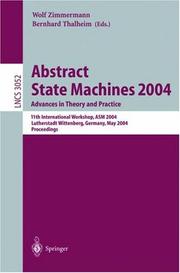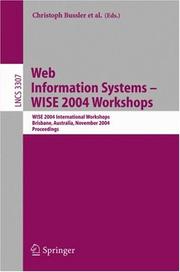| Listing 1 - 2 of 2 |
Sort by
|

ISSN: 03029743 ISBN: 3540220941 9783540220947 9786610307685 1280307684 3540247734 Year: 2004 Volume: 3052 Publisher: Berlin, Heidelberg : Springer Berlin Heidelberg : Imprint: Springer,
Abstract | Keywords | Export | Availability | Bookmark
 Loading...
Loading...Choose an application
- Reference Manager
- EndNote
- RefWorks (Direct export to RefWorks)
Abstract state machines (ASM) sharpen the Church-Turing thesis by the c- sideration of bounded resources for computing devices. They view computations as an evolution of a state. It has been shown that all known models of com- tation can be expressed through speci?c abstract state machines. These models can be given in a representation-independent way. That is one advantage of transferring these models to ASM. The main advantage is, however, to provide a unifying theory to all of these models. At the same time ASM can be re?ned to other ASMs. Stepwise re?nement supports separation of concern during so- ware development and will support component-based construction of systems thus providing a foundation of new computational paradigms such as industrial programming, programming-in-the-large, and programming-in-the-world. ASM 2004 continued the success story of the ASM workshops. Previous workshops were held in the following European cities: Taormina, Italy (2003); Dagstuhl, Germany (2002); Las Palmas de Gran Canaria, Spain (2001); Monte Verita, Switherland (2000); Toulouse, France (1999); Magdeburg, Germany (1998); Cannes, France (1998, 1997); Paderborn, Germany (1996); and H- burg, Germany (1994). The ASM workshops have had predecessors, e.g., the famous Lipari Summer School in 1993, whose in?uential outcome was the f- damental Lipari Guide.
Machine theory --- Computer science. --- Software engineering. --- Programming languages (Electronic computers). --- Computers. --- Computer logic. --- Mathematical logic. --- Computer Science. --- Logics and Meanings of Programs. --- Mathematical Logic and Foundations. --- Theory of Computation. --- Software Engineering. --- Mathematical Logic and Formal Languages. --- Programming Languages, Compilers, Interpreters. --- Algebra of logic --- Logic, Universal --- Mathematical logic --- Symbolic and mathematical logic --- Symbolic logic --- Mathematics --- Algebra, Abstract --- Metamathematics --- Set theory --- Syllogism --- Computer science logic --- Logic, Symbolic and mathematical --- Automatic computers --- Automatic data processors --- Computer hardware --- Computing machines (Computers) --- Electronic brains --- Electronic calculating-machines --- Electronic computers --- Hardware, Computer --- Computer systems --- Cybernetics --- Calculators --- Cyberspace --- Computer languages --- Computer program languages --- Computer programming languages --- Machine language --- Electronic data processing --- Languages, Artificial --- Computer software engineering --- Engineering --- Informatics --- Science --- Logic design. --- Logic, Symbolic and mathematical. --- Information theory. --- Communication theory --- Communication --- Design, Logic --- Design of logic systems --- Digital electronics --- Electronic circuit design --- Logic circuits --- Switching theory --- Machine theory - Congresses


ISBN: 3540238921 3540304819 Year: 2004 Publisher: Berlin, Heidelberg : Springer Berlin Heidelberg : Imprint: Springer,
Abstract | Keywords | Export | Availability | Bookmark
 Loading...
Loading...Choose an application
- Reference Manager
- EndNote
- RefWorks (Direct export to RefWorks)
The study reported in this paper is an ongoing effort. We reported a preliminary analysis of the data in the paper. The current experiments varied the subjects to c- duct online group learning activities by the communication media such as email and threaded discussion. Although, we could have easily learned the impact of mobile devices in learning if we divided the subjects to use different hardware such as p- sonal computers, personal digital assistant, or mobile phones, we believe our findings will still be able to provide useful insights on the difficulties that the mobile learners will face in solving problems as a group. Our analysis result will also provide ba- line information on whether the traits of the successful or failed online groups are applicable to the mobile learners. For example, we expect the SMS will be a better medium to overcome the major problem of instant communication or the rapid propagation of the information as the mobile phones have built-in mechanism to remind the users of the incoming new messages and also the mobile phone users are expected to be interrupted for the incoming messages. However, we need further investigation of other problems, which hinder the optimum online group work. For example, ‘accuracy of the transferred information’ was identified as one of the pr- lems of using emails as the communication medium. Personal Digital Assistant (PDA) or SMS are more apt to deliver shorter messages than the typical emails.
Computer communication systems. --- Multimedia information systems. --- Multimedia Information Systems. --- Computer science. --- Computer programming. --- Database management. --- Information storage and retrieval. --- Computer Science. --- Programming Techniques. --- Information Systems Applications (incl. Internet). --- Computer Communication Networks. --- Database Management. --- Information Storage and Retrieval. --- Computer-based multimedia information systems --- Multimedia computing --- Multimedia information systems --- Multimedia knowledge systems --- Information storage and retrieval systems --- Data base management --- Data services (Database management) --- Database management services --- DBMS (Computer science) --- Generalized data management systems --- Services, Database management --- Systems, Database management --- Systems, Generalized database management --- Electronic data processing --- Computers --- Electronic computer programming --- Electronic digital computers --- Programming (Electronic computers) --- Coding theory --- Communication systems, Computer --- Computer communication systems --- Data networks, Computer --- ECNs (Electronic communication networks) --- Electronic communication networks --- Networks, Computer --- Teleprocessing networks --- Data transmission systems --- Digital communications --- Electronic systems --- Information networks --- Telecommunication --- Cyberinfrastructure --- Network computers --- Informatics --- Science --- Programming --- Distributed processing --- Web databases --- Information storage and retrieva. --- Multimedia systems. --- Information storage and retrieval systems. --- Automatic data storage --- Automatic information retrieval --- Automation in documentation --- Computer-based information systems --- Data processing systems --- Data storage and retrieval systems --- Discovery systems, Information --- Information discovery systems --- Information processing systems --- Information retrieval systems --- Machine data storage and retrieval --- Mechanized information storage and retrieval systems --- Computer systems --- Electronic information resources --- Data libraries --- Digital libraries --- Information organization --- Information retrieval --- Application software. --- Application computer programs --- Application computer software --- Applications software --- Apps (Computer software) --- Computer software
| Listing 1 - 2 of 2 |
Sort by
|

 Search
Search Feedback
Feedback About
About Help
Help News
News